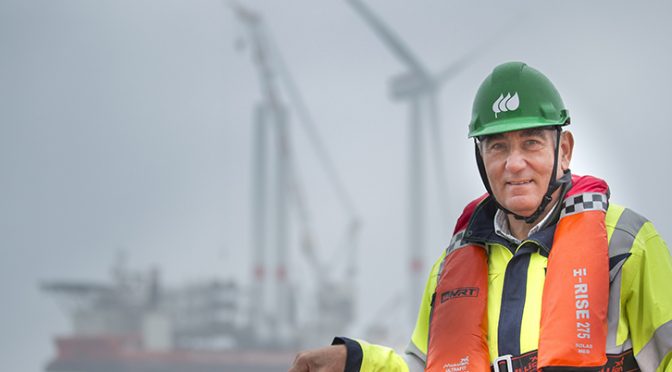- The Executive Chairman of Iberdrola stresses that achieving the goal of tripling renewables will require investments of 2.2 billion euros per year and that regulatory stability, adequate financing and institutional commitment are necessary.
- He points to young people as “essential accelerators of the energy transition”.
- Galán also highlighted the role of green hydrogen in the energy transition at an event organised by the European Round Table of Industrialists (ERT).
The Executive Chairman of Iberdrola, Ignacio Galán, assured this morning at COP28 that the objective of tripling the installed renewable capacity by 2030 is feasible. There are 118 countries that have already signed up to this objective at the Climate Summit being held in Dubai. They have also committed to double the energy efficiency ratio, increase electrification and reduce methane emissions and the use of fossil fuels. This commitment aims to limit global warming to 1.5ºC by 2050 compared to pre-industrial levels.
Iberdrola’s Executive Chairman made his first appearance this morning at the Abu Dhabi Sustainability Week (ADSW) Forum, where he stated that action to achieve the goal must be immediate.
Electricity demand needs to increase by a factor of 2.5 to achieve zero net greenhouse gas emissions. In this context, the Executive Chairman of Iberdrola stressed that, “to meet this demand, investments in the global electricity system will have to increase from 800,000 million dollars a year to 2.2 trillion dollars a year by 2030”.
The chairman of Iberdrola also pointed out that attracting the huge investments needed in renewable energies, grids and storage will require clear, predictable and stable energy policies to generate confidence and sufficient incentives.
Ignacio Galán has advocated for regulations that speed up permitting, facilitate long-term power contracts (known as PPAs) and adequately remunerate regulated assets. “We need to accelerate the expansion of electrification through renewables to reduce our dependence on fossil fuels. Grid investments must also grow exponentially, as nearly 80 million kilometres of grids will need to be added or replaced over the next 20 years,” he said.
The role of green hydrogen
The Executive Chairman of Iberdrola also participated in a debate organised by the European Roundtable for Industry (ERT) on the Future of Climate, Sustainability and Clean Energy. During the event, held in the COP28 Innovation Zone, Ignacio Galán highlighted the important role of green hydrogen in the energy transition; a technology that is already a reality and demonstrates the company’s commitment to new technologies to achieve a safe, clean and competitive energy industry. Galán also stated that “tripling renewable capacity by 2030 is possible, in the same way that we have already achieved in 2020 that more than 20% of Europe’s energy consumption will come from clean energies”.
The ERT brings together 60 CEOs and CEOs of European industrial and technology companies operating around the world – some producing a lot of energy, others operating in energy-intensive sectors – all of whom are committed to zero emissions and acting on a large scale to achieve the EU’s climate targets. For many companies, this commitment means the total transformation of their business operations around the world, in increasingly difficult geopolitical circumstances. The climate action agenda is global and must be a priority for all. The challenge is not only to achieve climate neutrality in the EU, but also internationally, as soon as possible.
As European industry has been at the forefront of inventing clean technology solutions to rapidly reduce emissions over the last decade, the ERT encourages governments to support the modernisation of infrastructure and to create an enabling environment for businesses, including energy-intensive industries, to decarbonise effectively, sustainably and competitively.
ERT members have combined revenues in excess of €2 trillion.
Galán's meeting with young climate activists
Afterwards, Ignacio Galán met with young climate activists at COP28 to discuss the career opportunities offered by the energy transition and how best to attract the green talent of the future.
Reinforcing Iberdrola’s commitment to clean technology education, Iberdrola Executive Chairman Ignacio Galán said: “Young people are a necessary accelerator of the energy transition and we are focused on creating the best pathways for them to build green careers of the future and benefit from a sustainable and prosperous green economy. The conversations we are having today are more important than ever to understand the expectations, needs and hopes of young people so that we can continue to improve access to our sector for generations to come”.
The event, hosted by Iberdrola and attended by UNICEF, focused on the vital role young people play in accelerating the energy transition and how developing skills in this area is directly linked to achieving sustainable, decarbonised and resilient economies and societies. The green economy is the future, and the jobs of the future are in the green economy.
Representatives from the International Labour Organization (ILO) and the United Nations Framework Convention on Climate Change (UNFCCC) were also present at the discussions. Amanda da Cruz Costa, founder and executive director of the Instituto Perifa Sustentável from Brazil; Saif Al-Qudah from the United Arab Emirates, specialist in energy transition and climate change mitigation; Shivi Dwivedi, ambassador to Antarctica from India; Martin Masiya, founder and executive director of the Instituto Perifa Sustentável from Brazil; Shivi Dwivedi, ambassador to Antarctica from the United Arab Emirates, specialist in energy transition and climate change mitigation; Martin Masiya, founder and CEO of Sollys Energy from Malawi; Nigerian-American Amara Nwuneli, Ashoka Fellow and founder of Preserve Our Roots; and Mohamed Ageez from Egypt, green jobs advisor and innovation policy researcher.


